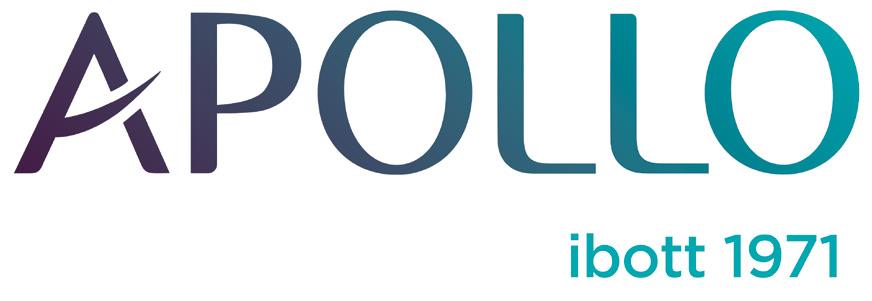Preparing insurance for the future of autonomous vehicles










Chris Moore, Head of the Apollo ibott 1971 syndicate, is possibly an anomaly within the world of insurance. Few kids dream of growing up into a life of underwriting, but Moore says he knew he wanted to get into insurance since going off to university.
“I studied mathematics at Bath University,” he tells us. “A lot of people talk about falling into insurance or just somehow ending up in insurance; I may be one of those that actually wanted to be in insurance. That's something I'm quite proud of.”
After graduating from university, Moore pursued a career as a broker in London, spending two years at Catlin before joining Apollo a decade ago. It’s no surprise that he has stayed: the company sits at the vanguard of new technologies, creating insurance solutions for emerging businesses that will be household names in a few years’ time.

“I love insurance,” Moore effuses. “We should be advertising the amazing things about the insurance industry and trying to recruit the freshest talent from university.”
One of Apollo ibott 1971’s biggest areas of focus is autonomous vehicles (AVs). Certainly, it has the potential to increase convenience for consumers and unlock new opportunities for mobility in our daily lives. But AV technology also has the potential to reshape the insurance industry, and insurers must hop on board early to ensure they’re fully prepared.
With autonomous vehicles set to disrupt the future of mobility, Apollo ibott 1971’s Chris Moore talks about the implications for the insurance industry

Moore believes that mistrust in autonomous vehicles is often misplaced, especially given most people are happy to fly in a plane or travel on a ferry while it’s in autopilot mode. “We trust autonomy in so many areas of our lives, including aviation and marine, but as soon as you start talking about autonomous vehicles people recoil,” he says.
In part, this is informed by distant memories of sci-fi catastrophe movies. It’s also a result of headline reporting, where a single AV crash will make front-page news but a million safe AV rides will not. “I would

absolutely get into an autonomous vehicle,” Moore says. “I might even feel a lot safer in it.”
According to McKinsey, autonomous driving could create revenues of US$300-400bn by 2035. Most new cars already feature some sort of autonomous technology, allowing drivers to maintain a constant speed or helping to switch between lanes, usually on highway or motorway networks. In future, this technology will enable

complete automation of vehicles – starting with industrial applications like agricultural vehicles and culminating in a full robotaxi experience that could make inter-city travel more comfortable and affordable – something that Chris Moore believes is the toughest mountain to climb for AV technology, not least because autonomous systems still struggle to predict irrational human behaviour, particularly in a lowspeed, urban setting.
“I think the size of the opportunity is huge, both in the AV industry itself but also in terms of the insurance opportunity that's
TITLE: HEAD OF APOLLO IBOTT 1971
INDUSTRY: INSURANCE

LOCATION: UNITED KINGDOM
Chris has been with Apollo since 2013 and was instrumental in the setup of ibott. With over a decade of experience with casualty and innovation, which he has a passion for, Chris believes in insurance products being an enabler for new progressive business models such as the sharing economy. He is FCII and CRIS qualified, as well as sitting on the Lloyd’s innovation panel and the Lloyd’s Market Association Committee for both US and International Casualty.

linked to that. When you think about the amount of disruption that autonomy can cause to almost all industries, it's really staggering.”
Broader adoption of AV technology will really depend on regulatory approval. There are already autonomous rideshare pilots happening in multiple US states, chief amongst which are probably California, Arizona, Florida and Nevada. The usual first-movers will predictably emerge, keen to attract inward investment, but while regulators remain to be convinced about issues such as safety and scalability, there are things that insurers can do today – such as prepare their businesses to analyse and price AV risk – that will set them up for an autonomous future.


Edge Case Insurance is proud to be exploring a partnership with Apollo ibott to provide risk-informed underwriting and insurance that supports safer AVs for everyone.
Learn more

Failing to do so could have dire business consequences. Insurers risk angering and alienating OEMs if they fail to recognise the potential around AV, provoking them into offering their own in-house insurance products in much the same way that Elon Musk has done at Tesla. After all, autonomous driving will only be a $300400m opportunity if insurers position themselves to take advantage of it.

AV technology will make our roads safer Summarising the nature of the opportunity that exists around autonomous vehicles, Moore believes it will take the worst elements of human behaviour – the fact that we are prone to error, are not very good at concentrating over long distances, and tend to panic in high-pressure situations such as near-crashes or losses of control – and replace it with the best attributes of automation. This will mean that, potentially, autonomous vehicles become safer than human-driven cars.
How much safer? In the US, data from the National Highway Traffic Safety Administration (NHTSA) showed that human drivers are involved in a fatal collision 1.33 times every 100m miles travelled – that’s a 0.00000133% probability of fatality, or
CHRIS MOORE HEAD OF APOLLO IBOTT 1971
“A lot of people talk about falling into insurance or just somehow ending up in insurance; I may be one of the few that actually wanted to be in insurance”
conversely, a 99.99999867% safety rate. Autonomous vehicles will have to be better than that to be accepted as a ‘safer’ technology – but thanks to advances in artificial intelligence and machine learning, that’s plausible.

“It’s clear that autonomous vehicles lead to a huge reduction in the frequency of loss and the frequency of accidents, which is something we can all be supportive of,” Moore says. “You will also see a reduction in the severity of injury. Autonomous vehicles will react quicker; they have quicker braking times and quicker response times so, if an accident cannot be avoided, you'd like to think that collision would be at a lower speed.”
Despite the road safety improvements, that won’t necessarily mean that insurers are better protected against claims. In fact, the severity of insurance loss could be a lot higher. This is because – in the same way that only AV crashes, and not successful AV journeys, make the headlines – the rare occasion when AV technology still causes injury or death will be highly exposed to so-called ‘nuclear verdicts’, where the AV operator is taken to court and sympathetic jurors award damages in excess of $10m. It often falls on the operator’s insurer to cover those damages. Take an already precarious situation when it comes to nuclear verdicts, and add in the supposition that these technologies are safe to use, and it becomes clear why this problem will only get worse in future.
Chris Moore says: “It will be a lot harder to defend autonomous vehicle claims because of that big nuclear verdict approach that plaintiffs might take. Where a standard human fleet operation might only buy $5m or $10m of auto liability in the United States, I think you'll probably see autonomous
vehicles companies buy multiples of that in terms of limits of liability. It's our obligation as insurance partners to really make sure we are very proactive on the claims and defence work that we do with our clients to stop that becoming prevalent, and stop that becoming part of the industry.”

One of the issues that could burn insurers is the lack of historical data. Today, insurers have 50 or 60 years’ worth of reliable data behind them to help understand auto insurance risk – but with autonomous vehicles being an entirely new technology, will they struggle to understand the level of risk they’re underwriting? Not necessarily, Moore explains, because many AVs will be so connected that insurers can benefit from real-time driving data.
It will be a change that forces the insurance industry into a complete overhaul. The average American driver spends just 55 minutes a day behind the wheel – that’s about 96% of the time that your car is parked in your garage or on your driveway. As new business models emerge from the AV revolution – including autonomous rideshares, car subscription services and flexible rentals – drivers will question the need to even ‘own’ a car at all.
“I think all insurance ultimately will shift from personal lines to commercial lines. The future of insurance is always going to be B2B”
CHRIS MOORE HEAD OF APOLLO IBOTT 1971
This will ultimately benefit the consumer. After all, ‘driving’ – or, to express it more accurately, being driven – will remain accessible but could become more affordable, especially if you’re only paying for what you use. But it will lead to a transformational shift within the auto industry. In the long term, ownership will transition away from consumers and into the hands of OEMs or leasing companies, who will offer autonomous vehicles to the public according to the extent of demand. This could be on a daily, hourly, or even mile-by-mile basis.
In turn, it will shift the insurance relationship from a largely B2C transaction into one that primarily exists as B2C. “I think all insurance ultimately will shift from personal lines to commercial lines,” Moore says. “The future of insurance is always going to be B2B.” He likens it to sharing economies such as Uber or Airbnb. They have embraced embedded finance and will embrace embedded insurance, too; if consumers had to arrange insurance separately when using these platforms, they would simply not bother using them at all.
Because of this shift, the rise of automated vehicles will also force insurers to be much more transparent about their pricing. “I think insurers need to remove this mystical curtain that we've sat behind. When a large commercial entity gets a quote, the insurer hides behind this curtain and then comes back with a price. They never tell you what that price is driven by.
“Now, we're in this digital environment where our biggest customers have arguably as much data as we do about what their risk looks like. Businesses are very educated buyers.

“I think that's where insurers need to be a lot more transparent to explain how they’re looking at risk and what’s driving
the price. And if an insurer’s assumptions are conservative, they might need to reduce that price over time. In that respect, you create this relationship that's far more fluid. Rather than insurers just ingesting data and spitting out a price, it becomes a two-way process.”
When it comes to automation, one of the oft-raised debates is about the continuing role of human labour. Will we all still have jobs when automation becomes ubiquitous, or will we need some sort of universal
payments to help those displaced by robots?
The most measured response usually involves humans and robots coexisting peacefully together in the same labour market. There is room for both. Indeed, Chris Moore says that there will still be a place for lorry drivers, for example, even if long-distance haulage is automated.
In the aforementioned examples of aviation and marine, there are still pilots monitoring the autopilot and conducting takeoffs and landings manually; a cruise ship or ferry can navigate huge swathes of ocean under automation, but it’s still brought into
dock by a combination of the vessel’s own captain and a local pilot who knows the idiosyncrasies of each port. There will be a continued interplay between automation and human supervision.
“As autonomous technology grows and becomes more robust, you'll probably need less human interaction. But that human interaction will take different forms,” Moore says. “People think there's going to be a mass layoff of people because you don't need drivers anymore. You still need these employees. It will just be a different type of job.


“There’s been plenty of studies into the impact of automation on human labour. A lot of it isn’t as impactful as you think”
CHRIS MOORE HEAD OF APOLLO IBOTT 1971
“There's been plenty of studies into the impact of automation on human labour. A lot of it isn't as impactful as you think. It's transferring that job so that, instead of sitting behind the wheel of a vehicle – which means you're away from your family quite often – now you’re going to be in a maintenance workshop because these vehicles have a different type of utilisation and they get used much more.
“Autonomous vehicles can drive throughout the day, throughout the night. There's no limitations on the times they can be driven, because that's stipulated by humans and how long they can keep their attention span."
Moore continues: “Instead, humans are working on maintenance or working in a control centre to make sure the vehicles operate smoothly – and what a much nicer form of employment that is.”
One of the ways that Apollo ibott 1971 is preparing for an automated future is through its partnership with US-based risk management research company Edge Case. “They are an autonomous vehicle-focused MGA,” Moore explains. “What they're trying to do is bridge the gap between the huge amounts of technical expertise and engineering that sits within the autonomous vehicle companies, and then the expertise that exists in the insurance world that is trying to build these insurance solutions.
“Bridging that gap helps build trust and makes sure that any insurance solutions are fit for purpose. Bringing that engineering capability or insight into insurers is hugely powerful to make sure that we build the right products, and we're pricing those products in the right way that's sustainable and reflective of the risk. They're a partner that's really important in bringing this future solution together.”
Looking ahead towards the future of autonomous driving, Moore continues:
“I think in the next five years, we’ll see rapid expansion of use cases around autonomy in lots of different circles – whether that's agriculture, trucking and long-haul driving, industrial manufacturing, or construction. I think all of those industries will see much more autonomy.
“From an insurance perspective, we will see those autonomous vehicle providers embedding insurance within their product, because it will take too long for traditional insurance companies that are currently insuring those verticals to build products that adequately cover autonomous-type operations. That'll be a huge market shift. Some people will say ‘I don’t write motor insurance, so why should I care about autonomous vehicles?’ However, I think it disrupts every insurance vertical that we have today. Autonomy will be just another insurance vertical, because it needs a brand new insurance solution.
“And then, for Apollo, we believe we are a relative first-mover in this space, but we are also very aware that collaboration is key in order to provide capacity for this huge autonomous opportunity. What we want to do is strategically partner with other insurers on providing large chunks of capacity on a wording that is fit for purpose, on a pricing basis that is reflective of the risk at hand. We're speaking to many insurers today – and whether we build that under consortiums, reinsurance agreements or however else, it's all about creating a partnership model that will deliver an insurance product for a much-needed industry as we want it to grow and flourish.”

